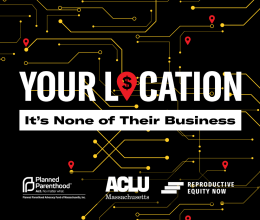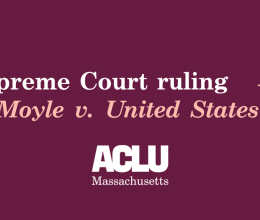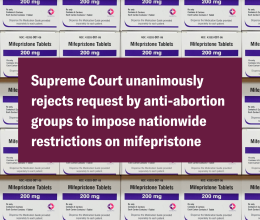
Breaking down barriers to abortion access
There’s a lot to celebrate this Women’s History Month: A record number of women serve in the 116th Congress. There are more women running for a single party’s presidential nomination than ever before. Across the country and in a variety of ways, women are resisting, persisting, and rewriting history.
Yet, people still face gender-based violence, discrimination, and institutional barriers every day. And no matter how far we’ve come, women will not be equal members in society until all people have full access to reproductive health care.
Indeed, this current White House poses an unprecedented threat to women’s equality and well-being: The Trump-Pence administration is waging an all-out assault on health care access and reproductive rights. The country’s new attorney general is a fierce critic of abortion rights, and the elevation of Brett Kavanaugh to the Supreme Court puts Roe v. Wade in grave danger. Across the nation, state legislators have quietly passed more than 400 medically-unnecessary restrictions, creating a web of roadblocks that push safe and affordable abortion out of reach.
In recent years, Massachusetts has charted a different path, and we must continue to lead. At a moment in history marked by violent, anti-abortion rhetoric, Massachusetts has the responsibility to send a message that women’s rights are not up for debate.
Take action to protect abortion access
Last legislative session, Beacon Hill eliminated archaic criminal penalties for abortion care. But still, our current laws maintain barriers to abortion for many women based on their age, their stage of pregnancy, or their income. In Massachusetts, our laws too often force people to seek approval for abortion care outside the doctor-patient relationship or to cross state lines in order to access safe, legal, and medically-necessary abortion. For a person without the resources or support needed to run legal gauntlets or travel long distances, complex medical decisions are made even more difficult. And every obstacle that delays care also increases complications or health risks.
The simple fact is that, even today, Massachusetts accommodates unnecessary, burdensome, and sometimes insurmountable political interference between a woman and her health care.
The ROE Act will help people in Massachusetts access safe, legal abortion by removing provisions that delay or deny care. If passed, it will ensure all people can access abortion without the state dictating when, how, or why.
Abortion is health care, and health care is a human right. Our laws should support and prioritize women’s health, not marginalize and otherize it. Instead of limiting health care options, we need to support a woman’s ability to make the best reproductive health decision for her, based on her circumstances. That’s how we treat every other personal medical decision in this Commonwealth.
This Women’s History Month, we need to make Massachusetts a national leader in reproductive freedom. Contact your state legislator, and tell them you support the ROE Act. Together, we'll work to remove obstacles to abortion and expand access for everyone.
Related content


Firewalls for Freedom
November 7, 2024
Reproductive advocacy groups applaud House effort to protect...
July 9, 2024
ACLU of Massachusetts statement on Supreme Court decision in...
June 27, 2024
ACLU of Massachusetts statement on Supreme Court decision in...
June 13, 2024
ACLU of Massachusetts comment on Supreme Court arguments in...
March 26, 2024
Cellphone location data used to target abortion misinformation to...
February 13, 2024
ACLU comment on Supreme Court decision in medication abortion case
December 13, 2023